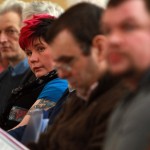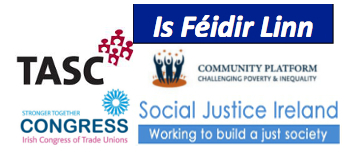NEWS RELEASE from Claiming Our Future
Campaigners recall ‘Back Lane Parliament’ to highlight absence of equality and environmental proposals in election campaign
Over 20 local meetings to quiz candidates on jobs, equality and political reform
Members of the Claiming Our Future movement today (Wednesday) staged a re-enactment of the 1792 ‘Back Lane Parliament’ in Tailors’ Hall, Dublin to demonstrate that the absence of equality and environmental proposals in the election debate was effectively disenfranchising large parts of civil society.
The movement announced that its local groups would be holding at least 20 public meetings across the
country to quiz election candidates on their policies for creating an equal and environmentally sustainable Ireland with real opportunities for people to participate in the political decisions that shape their lives.
Claiming our Future activists from around the country read out the group’s six priority policy demands, which were established by 1,000 participants at Ireland’s first ‘citizen’s parliament’ last autumn. They said many Irish people today felt the same sense of disenfranchisement that prompted Wolfe Tone to convene the 18th century Back Lane Parliament to petition for voting rights for Catholics. This is because the election is taking place after the Budget and IMF- European Commission agreement and because the policy platforms put forward by the political parties have so far failed to substantively address equality and environmental sustainability issues.
The event also saw the publication of a summary of Claiming Our Future policy priorities, based on equality and environmental sustainability, which it is sending to all party leaders. The priorities include:
- A sustainable alternative to the boom-and-bust economy
- A more equal society
- Political reform
- Decent and sustainable jobs
- Radical reform of the banking system and
- Public service reform.
Niall Crowley of Claiming Our Future said the election had so far yielded no substantive proposal for a more equal Ireland from any political party. “We have seen many proposals on political reform but none to address the lack of diversity and gender equality among our public representatives. The same goes for public sector reform. A myriad of proposals but not one to enhance the ability of our public services to eliminate disadvantage or address the diverse needs of the people who use them,” he said.
Charles Stanley-Smith of An Taisce said: “The voices of those who seek environmental sustainability are not being heard. Economic growth continues to be the accepted wisdom with no proposals from the political parties about unsustainable resource use, capping emissions or improving public transport. The disenfranchisement of this voice diminishes our chances of emerging from crisis.”
Siobhan O’Donoghue of the Community Platform announced that local Claiming Our Future groups would be holding at least 20 public meetings over the next two weeks at which election candidates would be invited to outline their values and policies. “Can they offer universal access to care and health care? Will they ensure equality in access to education? Could they reform politics so that people can participate in the decisions that impact on them? Can they advance equality so that everyone has an adequate income and nobody earns more than a set maximum income?” she asked.
Claiming Our Future is made up of individuals and organisations that believe the economic crisis is an opportunity to reassert the progressive social values of equality, sustainability, inclusion and human dignity. Initially developed by Is Feidir Linn, the Irish Congress of Trade Unions, environmental groups, the TASC think tank and Social Justice Ireland, it now involves a much wider range of organisations including community groups, youth groups, environmental groups, trade unions, rural networks, social justice groups and organisations representing older people, global justice, migrant workers, students, cultural initiatives, women, people with disabilities and social media.
ENDS
Further information
Bernard Harbor
Niall Shanahan










